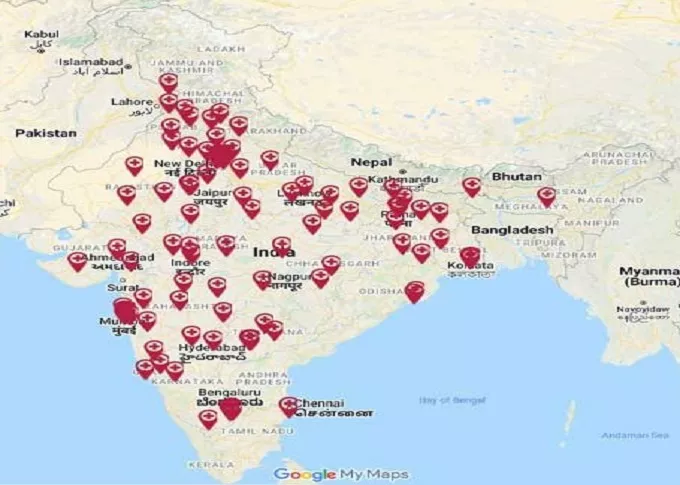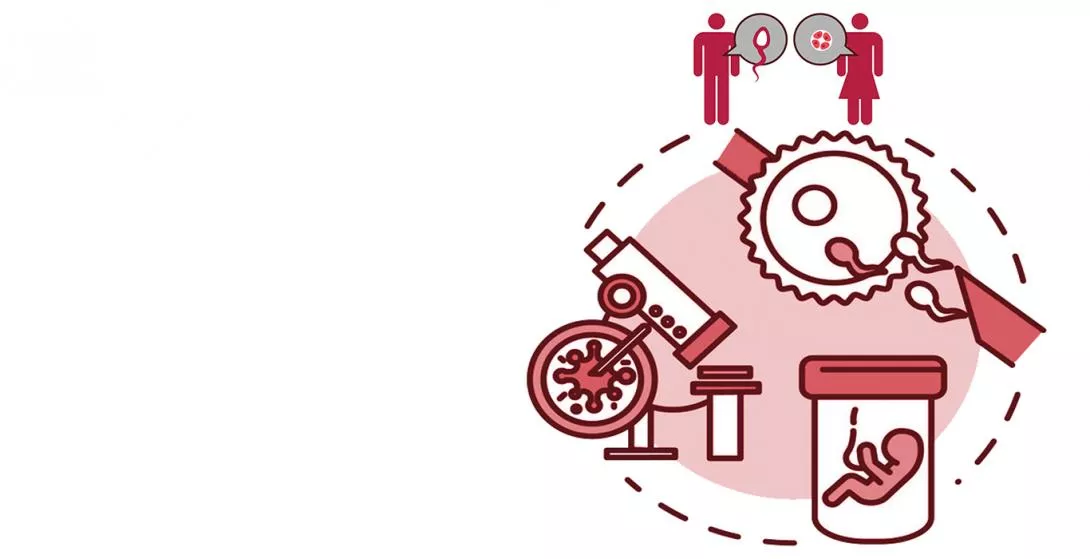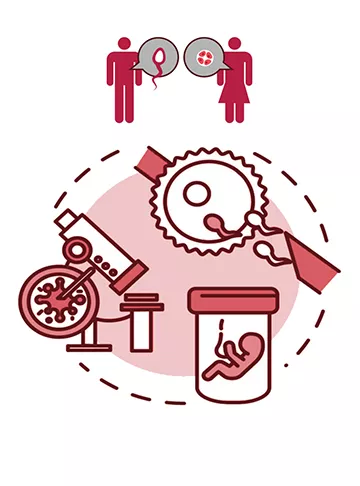What is IVF (In Vitro Fertilization)?
An assisted reproductive method called In Vitro Fertilization (IVF) involves taking eggs from your ovaries and fertilising them with sperm in a specialist facility. The possibility that a pregnancy will develop is increased by allowing the fertilised egg (embryo) to mature in a safe environment for a few days before being placed into the woman's uterus (on the uterine wall).
The IVF technique entails a number of stages and is a bit complex procedure. This covers the period of time prior to egg retrieval during which a person takes fertility medicine up until a pregnancy test is conducted.
Why is IVF treatment carried out?
Several different reasons might lead people to consider IVF, such as infertility problems or when one spouse has a pre-existing medical condition. When previous fertility treatments have failed or if the woman is beyond her reproductive prime, some individuals consider IVF treatment. It is a reproductive choice that is available to same-sex partners as well as to individuals who want to become parents.
IVF is a possibility if you or your partner has:
- Endometriosis
- Low sperm count or other issues with sperm
- Damaged or obstructed fallopian tubes
- Complications with your uterus
- Ovarian problems such as Polycystic Ovary Syndrome (PCOS) or others
- A chance of passing on a hereditary illness or disease
- Either a gestational surrogate or an egg donor is being used
What are the stages of IVF treatment?
It might take anything between four and six weeks to finish an IVF cycle and conceive the IVF baby. The sequential IVF process includes the following:
-
Birth Control Pills or Oestrogen
Your doctor can recommend oestrogen or birth control tablets before you begin IVF therapy. This is used to regulate the time of your menstrual cycle and prevent the growth of ovarian cysts. It enables your doctor to manage your treatment and increase the number of mature eggs collected during the egg retrieval operation.
-
Ovarian Stimulation
In a normal woman, each menstrual cycle results in the production of one egg. However, several eggs are necessary for IVF. The likelihood of creating a healthy embryo improves when more than one egg is used. To boost your body's egg production, you'll be given fertility medications. You'll be prescribed injectable hormone medications during your IVF cycle to encourage all of the eggs in that cycle to develop at once and completely. In order to track the development of eggs and determine when to collect them, your doctor will do routine blood tests and ultrasounds during this period.
-
Ultrasound Examination
To evaluate how well the medications on your ovaries are working, a vaginal ultrasound test is performed at regular intervals. If the outcome is bad, it's possible that your doctor will suggest stopping the IVF treatment cycle. You and your doctor will decide together on this.
-
Egg Retrieval
The egg retrieval procedure is carried out 36 hours following your hormone IVF injections given for stimulation. Transvaginal sonography is used to help retrieve eggs from the ovaries while the patient is under general anaesthesia. Your reaction to the medications will determine how many eggs are collected, and the operation lasts 15 to 30 minutes. Around two to three hours following the treatment, you can leave for home. Sometimes there may be some stomach pain and vaginal spotting, but these symptoms usually go away in a day or two.
-
Sperm Collection
A sample of semen is required from your spouse. On the day the eggs are harvested, a sample of fresh semen is often taken. A previously frozen sample can also be used, though, if a fresh sample can't be made on the same day or if the spouse isn't there on the day, the eggs are collected. The sperm and the eggs will be combined by a technician in a petri dish. If it fails to result in embryos, your doctor can choose to perform ICSI.
-
Fertilising the Eggs
The eggs will be fertilised in the laboratory, either through ICSI or traditional IVF. The embryologist will check the eggs the following day to see whether they have been fertilised and then later to see if any embryos have developed further. It is possible to freeze additional well-developed embryos if there are more than three for eventual later transfer.
-
Embryo Implantation in the Uterus
This is done two, three, or five days following egg harvest. To decide if a day 3 or day 5 transfer is necessary, embryologists keep an eye on the development and viability of the embryos. The embryo is positioned in your uterus using a tiny catheter that is implanted. It takes between six and ten days for the implantation to take place if the operation is successful. A course of medicines to assist the luteal phase will be provided to you after the transfer.
-
Pregnancy Test
A pregnancy blood test is carried out after two weeks following extraction. In the event that the test is positive, the patient is thought to be four weeks pregnant.
Role of Injections in IVF
In IVF, injections play a pivotal role, particularly in the crucial phase of ovarian stimulation. To enhance the chances of successful fertilization, injectable hormones like follicle-stimulating hormone (FSH) and luteinizing hormone (LH) are administered. The purpose of using such injections for IVF is to induce the development of multiple follicles within the ovaries, each containing a potential egg. This step is vital as it deviates from the natural menstrual cycle, where only one egg is typically produced per month.
Once the follicles have reached the optimal size, the next crucial step involves triggering the final maturation of the eggs. IVF injections like Human chorionic gonadotropin (hCG) are employed for this purpose. This injection is a key element that ensures the eggs are ready for retrieval. The timing is crucial, and these injections in IVF facilitate the synchronization of the reproductive process, paving the way for a successful IVF procedure.
Following the retrieval of eggs, IVF shots continue to play a crucial role in the preparation of the uterine lining for embryo implantation. IVF hormone injections like progesterone come into play at this stage, mimicking the natural rise in progesterone levels post-ovulation. This hormonal injection for IVF treatment is essential for priming the endometrium and creating an optimal environment for the successful implantation of the embryo. It is a meticulous phase, demanding precise administration to maximize the chances of a successful pregnancy.
Along with traditional injections, the significance of intracytoplasmic sperm injection (ICSI) cannot be overlooked in the context of IVF. This technique involves the direct injection of a single sperm into an egg, bolstering the chances of successful fertilization. Though not a conventional IVF injection for pregnancy, ICSI is an integral component of the test-tube baby process, exemplifying the innovative techniques employed to optimize reproductive success.
IVF injections are a pivotal element in the realm of assisted reproductive technology, offering hope to couples facing infertility challenges. From stimulating controlled egg production to orchestrating precise reproductive processes, these injections significantly enhance the chances of a successful IVF cycle. Despite temporary IVF side effects, the potential reward of achieving a desired pregnancy makes the journey worthwhile. As technology advances, the evolving landscape of IVF injections continues to open new possibilities for couples seeking to build their families through assisted reproductive technologies.
What are the potential complications associated with IVF?
IVF carries complications, just like any other medical treatment. Among the challenges are:
- The risk of low birth weight and early birth is increased by multiple pregnancies
- Miscarriage
- Ectopic pregnancy; condition when your fertilised egg implants outside of your uterus
- A rare disorder called Ovarian Hyperstimulation Syndrome (OHSS) causes an excessive build-up of fluid in the chest and abdomen
- Injury to the intestines or bladder, bleeding, or infection
- You might encounter headaches, mood fluctuations, and stomach pain as a side effect of using fertility medications
Precautions following an IVF procedure
- In general, it's best to avoid engaging in strenuous activity, heavy lifting, and other activities that include or may entail jarring motions
- To increase your chances of getting pregnant, follow the doctor's instructions for taking any prescription drugs
- Avoid drinking alcohol, smoking, being around cigarettes, and being around X-rays
- Before taking any medication, please visit your doctor
Pregnancy Calculator Tools for Confident and Stress-Free Pregnancy Planning
Get quick understanding of your fertility cycle and accordingly make a schedule to track it
Get a free consultation!















